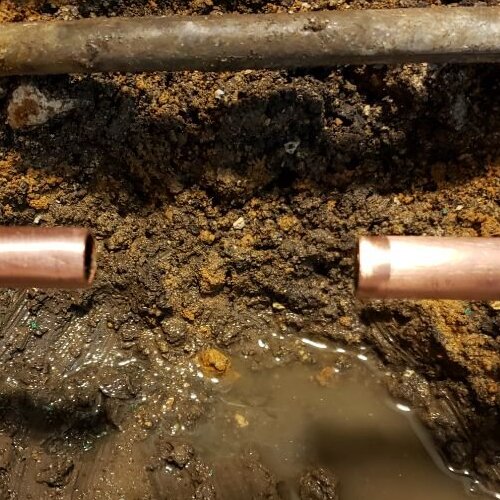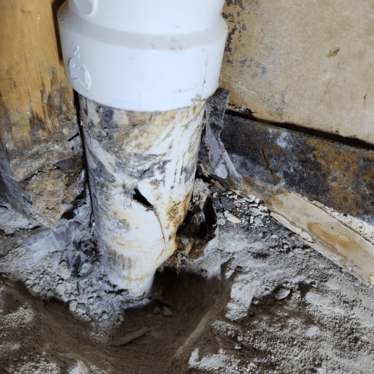
Importance of Leak Detection
Homeowners have enough expenses with mortgage, insurance, taxes, and utilities without an unknown plumbing leak. Detection systems can be an added expense upfront, but savings are long-term, especially when it comes to the structure of your home. If you think you might have a leak and want expert water leak detection in Victorville, CA, give Inland Pro Plumbing a call at 760-951-1721.
Can water leaks be dangerous?
Even the smallest water leak can leave cause enough damage to affect your family’s health and your home’s value. Here are two examples of what can occur with a small, simple water leak:
- Fungus and Mold
An undetected water leak will create serious fungi and mold that produce spores that infiltrate the air inside your home. This leads to health issues which can be worse for anyone that has breathing conditions already.
Homes with high humidity can have a high level of mold spores. Water speeds up their growth. Mold is ugly, but it is the unseen damage that can cause more harm. The spores spread through the air, causing, and irritating allergies, coughing, nasal congestion, sneezing, and sniffling. Anyone with a weak immune system suffers the most.
- Financial Concern
Leaks cause water pressure drops, yet you’ll see water bills increase. In addition to the expense of the water bill increase, there is structural damage to be dealt with too.
Can water leaks cause structural damage?
Health issues are enough reason to address water leak issues, but the structural damage can be severe too. Discoloration, stains, and streaks are the most obvious results of the leak, that professionals with water leak detection equipment can catch before they get to this point. Left unchecked leaks cause deterioration in the flooring, framing, and support beams.
What happens if you don’t fix a leak?
When you neglect a leak, the water will keep flowing, causing structural damage. Wood warps, floors and walls weaken, and foundations crack and weaken. With a damaged foundation, the rest of the structure is weakened.
What happens if you have a water leak under your house?
A leak under the house, aka a slab leak, will cause three things immediately:
- Water bill increase
- Water pressure drops
- Floor dampening
It is the consequences of this type of water leak that are expensive and long-lasting. Starting with mildew and mold, causing asthma and other respiratory issues.
The structural damage affects the foundation, causing it to shift, sink, and crack. The walls are weakened, and the carpeting and flooring become waterlogged. Your home will begin to have a foul smell, and the water leak will eventually destroy the landscaping.
How can you tell if a pipe is leaking in a wall?
It is estimated by the EPA as much as one trillion gallons of water is wasted annually from plumbing leaks. As much as 90 gallons a day are from homes! With water leak detection, most of this could be eliminated.
Here are a few ways to tell that you have a leak:
1. Water Bills Skyrocket
A water bill increase in the summer is nothing unusual and having holiday guests can cause an increase, too. However, if you’re getting higher water bills for no obvious reason, you need to inspect your home for a leak.
2. Mildew & Mold
Even the cleanest of homes can have some mildew and mold growth in areas like showers and tubs. If you see mildew and mold outside of the tub, there could be a water leak. Mold on the baseboards and walls, ceiling, and floors, in the kitchen, are sure signs of leaks.
3. Musty Odor
You usually smell mildew and mold before seeing it. So, when you can smell it, you need to look for it! If it isn’t obvious, it is probably inside the walls, under the flooring, or in the air vents.
4. Damages and Stains
What may start off as a slightly dingy spot on the ceiling, can develop into a watermark. This isn’t something to overlook–a leak is likely causing this stain. It may be a roof leak; it could be a plumbing leak. Left unaddressed, the ceiling may begin to sag, taking away support for the walls, and eventually, affecting the flooring.
5. Water Meter Running
If you suspect a water leak, detection can be done by turning all the water off inside and outside the house. Check the water meter and if isn’t moving, there is no water leak. If the meter is running, you have a water leak somewhere.
6. Wet Areas
Random wet areas in the house or around the exterior, like puddles around the exterior walls or in the lawn, could indicate a leak. Where there are leaks, mildew and mold soon follow.
7. Cracking Foundation
A house will settle over time naturally, which can cause hairline cracks in the ceiling and walls. However, a random, sudden crack that can’t be explained is probably from a water leak.
How do you know you have a leak in your water line?
A water leak, no matter how small, shouldn’t be ignored. Leaks can cause serious damage and costly repairs. The following are indications that you may have a water leak inside your home:
- A noticeable drop in water pressure
- Hissing, running, or splashing water noises
- Dirty or rusty water
- Mold odor and growth or increase of water-loving insects
- Sewage odor
- Increasing water bill over 2 to 3 months
The following are indications that you may have a water leak outside of your home:
- Saturated, wet areas in your lawn
- Potholes and sinkholes
- Sewage odor
- Unusually green area of the lawn
- Cracking paved areas around your home
- Increasing water bill over 2 to 3 months
How do plumbers detect hidden leaks?
A professional plumber will have a tried-and-true routine in water leak detection, starting with a walk-through around your home. They typically check fixtures and under the sinks. They will inspect any irrigation system and pool system. They will then check the water meter check.
After these things have ruled out any obvious leaks, they will use special equipment for water leak detection. This is an underground sound detection tool that involves headphones and a microphone that allows the plumber to hear running water ground. Plumbers may also use video cameras to find leaks.
Can leaks stop on their own?
Sometimes leaks might slow down as the fittings swell up under water pressure. Occasionally, calcium sediment in the water can seal a leak as will the metal oxidizing under micro expansion, but this won’t last long. Leak sealants that you can buy at big box stores also serve as a temporary fix. Usually the pipe will need to be repaired or replaced. For water leak detection service in Victorville, CA, call 760-951-1721.

